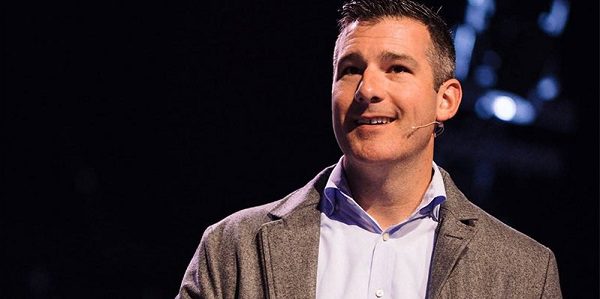This Sunday I will preach the kickoff sermon of the spring semester at my campus ministry. After meeting with our worship and spiritual formation student leaders, we determined that forgiveness was going to be the message topic. So I’ve started wrestling with how to talk about forgiveness And all I can think about is the 20 minute standing ovation that Memphis evangelical megachurch pastor Andy Savage received after admitting to a “sexual incident” (forced oral sex) with a youth when he was a youth pastor two decades prior.
Andy Savage’s standing ovation is a good snapshot of the evangelical theology of forgiveness. We love redemption stories. We expect humanity to be totally depraved. Horrendously wicked sin is not supposed to scandalize us, as long as it’s in the past (and ideally pre-conversion). We teach that Christians become entirely different, utterly discontinuous people when they’re saved. We don’t like the idea that people always live under the shadow of their past mistakes because they’re new creations; the old is supposed to be gone. Of course it’s a bit of a problem that Savage was a Christian youth pastor and not a “pre-saved” heathen when his sin occurred but that just means that he actually got saved after the incident happened, according to the official way it’s supposed to work.
I understand the ethos of the people giving that standing ovation. They wanted to make it a good redemption story with a happy ending for a pastor they loved. They weren’t thinking about the discrepancy between Savage’s vague account of an “incident” and Jules Woodson’s testimony about being driven to an abandoned location and ordered to perform oral sex on her youth pastor. They presumably didn’t understand that the “biblical counsel” Savage claimed to have sought involved his superiors refusing to remove him from leadership until the pressure got too intense and Savage subsequently transitioning into a new church job four months later. They couldn’t have been contemplating the way that Savage has meticulously managed the narrative and framed it as a violation of “his personal purity standards” and not in any way a crime which would upend his life and career path.
There’s a theological reason that all of these details can be swept aside by a standing ovation. In the evangelical account of forgiveness, Jesus’ sacrifice on the cross erases past sin. Jesus’ blood erases not only the “incident” itself, but all of Savage’s attempts to rationalize and minimize it. It erases any inappropriateness in the responses of his supervisors to his sin. It erases everything except for Jules’ refusal to be “reconciled” to Andy Savage according to his terms. For evangelicals, Jesus’ penal substitution is the same thing as Donald Trump’s pardon pen. It erases all culpability, all accountability, all responsibility for processing, growth, reparation, and reconciliation. This is because evangelical atonement is “objective,” not “subjective.” It’s about satisfying God’s wrath against sin, not about giving a Christian believer the courage to face the evil he’s done with integrity.
In the evangelical nihilistic understanding of sin, what Andy Savage did is no more blameworthy than whatever sins his victim committed in her life (which is why Savage’s senior pastor prayed for forgiveness for Jules). Both Andy and Jules deserve to be tortured forever in hell, and they will only get out of it if they’ve demonstrated their “faith” earnestly enough for God to move them from the “no” column to the “yes” column in the Book of Life. This means that if Andy’s sin has caused Jules to reject Christianity, then he goes to heaven and she goes to hell. His theology allows him to offer publicly with complete sincerity to sit down with Jules and pray with her for her sin of not forgiving him as though he’s the magnanimous one and she’s the one stubbornly resisting the will of God. What’s maddening is that he probably isn’t inwardly tortured because he’s done everything his theology prescribes for him to do.
It’s not just that evangelical theology is patriarchal and creates an unhealthy understanding of sex that lacks any concept of consent. It’s not just that Andy Savage is a complete hypocrite for preaching a sermon series on sexual puritanism while refusing to face the full gravity of the crime he committed against Jules Woodson. The standing ovation in Memphis is a much more fundamental theological failure than either of those points.
Forgiveness is the core of Christian spiritual life. That’s why my student leaders were insistent that we start with forgiveness in our Epiphany season sermon series on the gifts Jesus has to offer. But when forgiveness is made into the erasure of sin and the need to maintain a superficial feel-good narrative in order to keep a community positive, then the one powerful antidote forgiveness is supposed to offer has been completely sabotaged.
Jesus doesn’t erase our sin; he redeems our sin. The difference between those two verbs is everything. Jesus’ atonement is supposed to make it possible for us to face the truth about our lives without shame and embrace whatever reparations or consequences our mistakes require without fear. The only way this makes any sense theologically is if we understand the “payment” of our sin’s debt to be something Jesus does to win our trust as perpetrators and victims of sin, not to make an impersonal, one-size-fits-all transaction with his Father’s heavenly ledger book. A strictly objective atonement theology sabotages the possibility of restorative justice by making God and the sinner the only parties in a heavenly courtroom with no plaintiff. When every sin is nihilistically wicked to the point of requiring an absolute penalty of eternal conscious torment, the victims of sin are completely erased from any resolution of sin. The universe becomes a solipsistic reality composed of the sinner and God.
So what if forgiveness is about redemption rather than erasure? What if Jesus on the cross is not an abstract divine credit card for a heavenly ledger book in the appearance of a man, but an actual living, suffering human being whose wounds strangely become the source of healing for the nations? Jesus does say as he’s being crucified, “Forgive them, Father, for they know not what they do.” That’s true of all of us in all our sins. Andy Savage had no idea what he was doing to Jules Woodson. In accordance with the evangelical sexual ethics he had learned, he understood his actions entirely in terms of his “personal purity standards.” He was remorseful immediately (according to both of their stories), not for causing tremendous harm to Jules but for violating God’s demand for purity and leading Jules into doing something “impure” with him.
So what does it mean to say “forgive them for they know what they do”? Does it mean that because sinners didn’t know what they were doing, the harm they caused doesn’t really exist? Does intention determine culpability? What if forgiving someone for having done evil without understanding what they were doing involves helping them face the evil that they did so that they don’t carry unaddressed guilt in the bottom of their souls for the rest of their existence? What if that unaddressed guilt is the eternal conscious torment of hell from which we need to be saved? What if the standing ovation Andy Savage received is the eternal conscious torment of his personal hell? All I know is I do not want to stand before the One who is absolute truth with unaddressed guilt, because the kinder that One is to me, the more that kindness would be eternal conscious torment if my guilt is unaddressed.
Jesus didn’t die to give us masks of justification to wear and cause the elephants in the rooms of our communities to multiply and suffocate us. Jesus died to heal us. The justification of his blood doesn’t mean “The evil you did doesn’t matter.” It means, “Put your guilt on my cross so that you can focus on the healing that needs to happen.” What we have to understand is that the healing of forgiveness is a slow process in which the victim must be completely empowered and the perpetrator must be completely deferential. It’s not healing to say, “Let’s talk this out and be done with it so I can stop feeling guilty.”
Sometimes when I hurt somebody, healing requires that I disappear from that person’s life and let others be their healer. That’s really hard to do. Healing will absolutely not happen as long as the perpetrator is in control of the process. The pain of unresolved conflict is a critically important part of the healing process for the perpetrator. I’m dealing with that right now in a relationship where the person who is mad at me has refused to accept my apology or even acknowledge my attempt to make one. It’s quite painful and it seems unfair (being a completely different type of situation than Andy Savage’s situation), but God is using it to help me grow. Repentance is short-circuited by a theology of instantaneous absolution and nihilistic whataboutism.
To try to force forgiveness is to play God in the most despicable way. It is blasphemy and sabotage of the real process that needs to occur. True forgiveness is always a gift from God. I can say “I forgive you” to someone else if I’m a victim of their sin, but the actual relief of healing the wound they made is something I receive from God, not something I can will for myself. Likewise when I hear “I forgive you” from someone I have sinned against, the actual internal release from my guilt is a gift I have to receive from God. Forgiveness is long, slow work that God does on our hearts as victims and perpetrators of sin. It’s not a proclamation that demands us to avert our eyes from the truth of the past, though proclamations can be part of the process.
There’s so much more to be said, but I’m limited in time. The question asked by true forgiveness is not: When can we move on and pretend like none of this ever happened? True forgiveness asks: Do you want to be healed? Jesus invites all of us, who have been victims and perpetrators of sin in varying, complicated, and messy ways throughout our lives, to be healed by his wounds and to become wounded healers alongside him. If Christians become wounded healers rather than self-alienated erasers of truth, then we can be the gift to the world that Christ intended.
Check out my book How Jesus Saves the World From Us!
This blog is an integrated part of my ministry (e.g. this blog post exists because of the sermon I will be preaching on Sunday). If you have benefited from reading my blog, then please support NOLA Wesley as a one-time donor or monthly patron!













